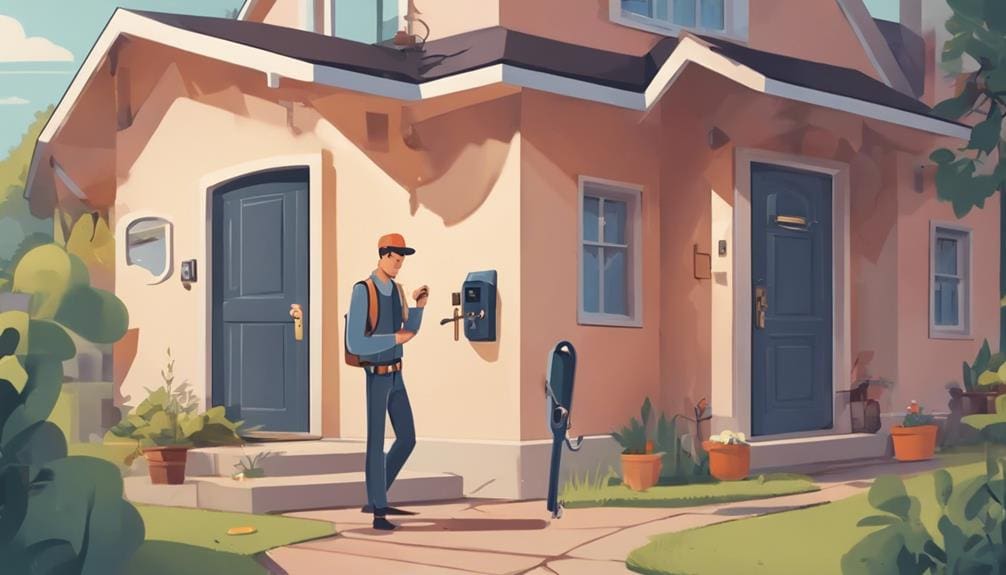First, evaluate your situation. Determine if you misplaced your key, accidentally left it indoors, or if the lock is damaged. Look around for other entry options such as windows or rear entrances. If no access points are found, collect information about the lock and your location, then contact a reputable locksmith like Low Rate Locksmith. While waiting, remain visible and secure, preferably in a well-illuminated location. To prevent future lockouts, think about smart locks or storing an extra key with a reliable neighbor. For more thorough strategies and solutions, you’ll discover additional expert advice and precautionary measures.
Key Takeaways
- Assess the situation by determining if the key is misplaced, left inside, or if the lock is malfunctioning.
- Check potential entry points like windows, back doors, and basement entrances for any security vulnerabilities or unfastened locks.
- Contact Low Rate Locksmith by gathering your address and lock type, then calling their emergency contact number for assistance.
- Wait for the locksmith in a secure, well-lit location, keeping your phone charged and within reach.
- Prevent future lockouts by double-checking for keys before leaving, designating a key spot, or installing a smart lock system.
Assess Your Situation

First, determine whether you’ve misplaced your key, left it inside, or if the lock itself is malfunctioning. Begin by checking your immediate surroundings for the key. Look in pockets, bags, and any other places you might have absentmindedly placed it. If you confirm you’ve lost it, retrace your steps methodically, considering the last known location you used the key.
If you think you left the key inside the house, visually inspect through windows or glass doors to see if you can spot it. A quick glance can save you significant time and effort. If the key is inside, you’ve already narrowed down your next steps to gaining re-entry without it.
In case neither scenario applies, and you suspect the lock is malfunctioning, conduct a brief but thorough examination of the lock. Check for signs of wear, stuck components, or any visible damage. Test the lock with gentle pressure to see if it gives way or shows signs of internal issues. Identifying a malfunctioning lock early will empower you to decide if you need a repair or a complete replacement, positioning you to make informed, decisive actions swiftly.
Verify Access Points
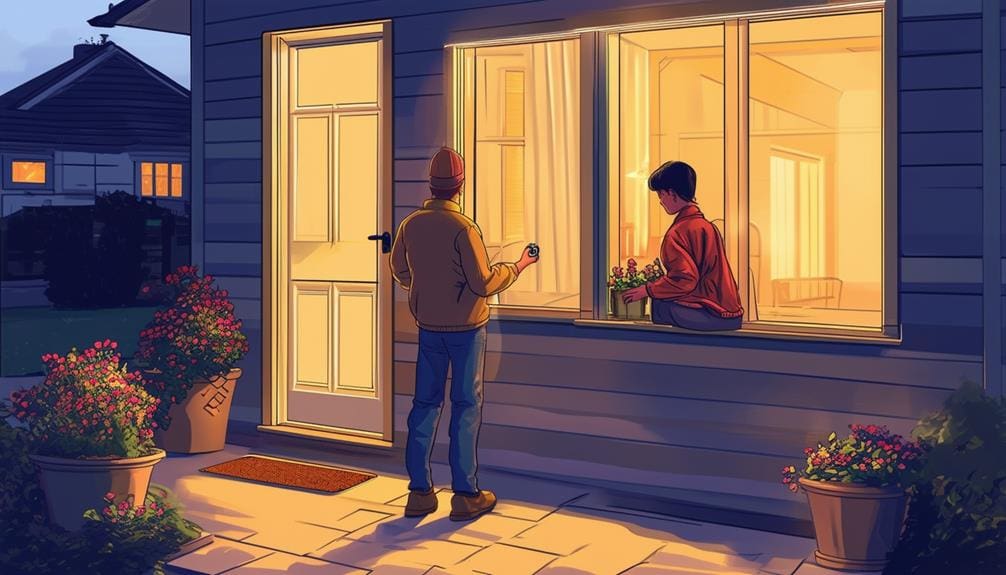
Begin by systematically checking all potential entry points, including windows, back doors, and even basement entrances, to identify any alternative ways to regain access to your home. Start with the ground-level windows. Test each lock to see if any are unfastened or can be easily opened. Don’t forget to check for damaged or loose frames that might allow entry.
Next, move to your side and back doors. These are often less secure than the front door, and you might find an unsecured or easily manipulated lock. If you have sliding glass doors, inspect their locks and tracks for any inadequacies that might be exploited to gain entry.
Don’t overlook basement entrances. These are frequently forgotten but can offer another pathway back inside. Check the integrity and locking mechanisms on basement windows and doors. If you have a garage, try entering through it, especially if it has an interior door to your home.
Methodically verifying each access point maximizes your chances of finding an entry without causing damage or resorting to professional help. By thoroughly inspecting every potential entry point, you maintain control of the situation and demonstrate resourcefulness.
Contact Low Rate Locksmith
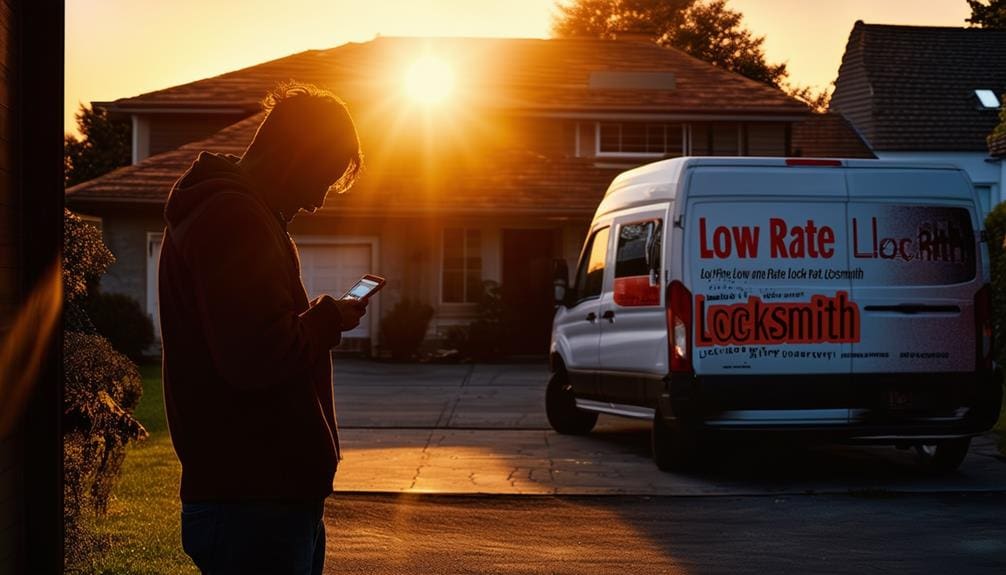
Once you’ve exhausted all potential entry points, it’s time to contact Low Rate Locksmith for professional assistance. Their team of experts offers efficient, reliable solutions to get you back inside your home quickly. To streamline the process, follow these steps:
- Gather Necessary Information: Have your address, contact number, and a brief description of the lock type ready.
- Call the Locksmith: Dial the emergency contact number for Low Rate Locksmith, available 24/7.
- Provide Details: Clearly explain your situation and share the gathered information.
| Step | Details |
|---|---|
| Gather Necessary Info | Address, contact number, lock type |
| Call the Locksmith | Use the 24/7 emergency contact number |
| Provide Details | Clearly explain your situation and share info |
| Await Confirmation | Wait for the locksmith to confirm your request and provide an ETA |
Their professionals are equipped with the latest tools and techniques to handle various lock types, ensuring minimal damage and maximum efficiency. They understand the urgency of your situation and aim to resolve it as swiftly as possible. Remember, staying calm and providing accurate information helps expedite the process. Contacting Low Rate Locksmith is a decisive step towards reclaiming access to your home with minimal hassle.
Wait for Assistance
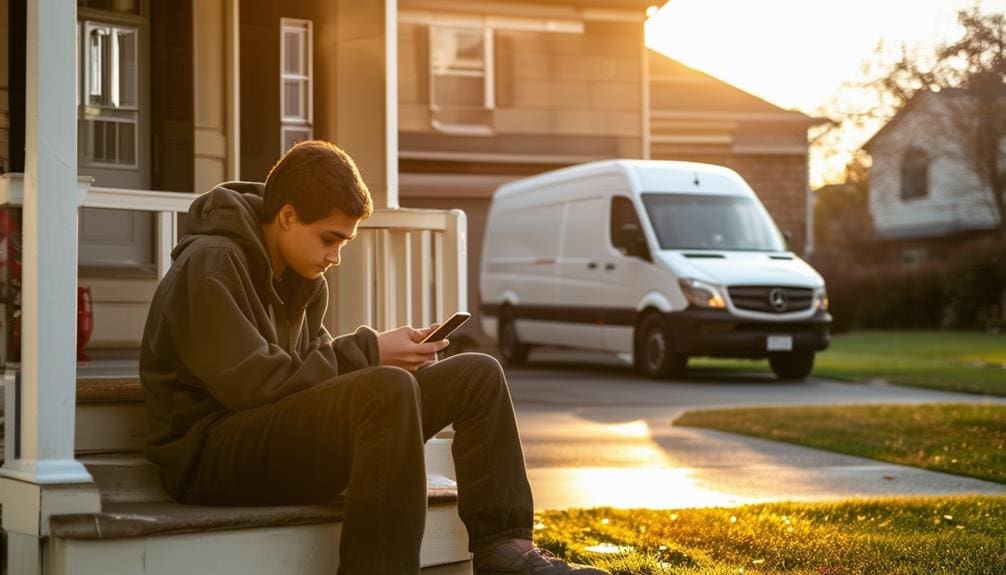
While you wait for the locksmith to arrive, make certain you remain in a secure and visible location where they can easily find you. This guarantees a quick resolution. If possible, position yourself near a well-lit area, especially at night. Inform the locksmith of your precise location, including any landmarks or distinguishing features.
Next, keep your phone charged and within reach. You might receive calls for updates or instructions from the locksmith. It’s also wise to have a backup contact in case your phone dies. If it’s cold or rainy, find shelter nearby but stay close enough to see the locksmith when they arrive.
In situations where waiting outside isn’t safe, such as during extreme weather or in an area with questionable security, seek refuge in a nearby business or with a neighbor. Always inform the locksmith of this change in location.
Stay vigilant and keep an eye on your surroundings. Avoid engaging with strangers about your situation; not everyone has good intentions.
Prevent Future Lockouts
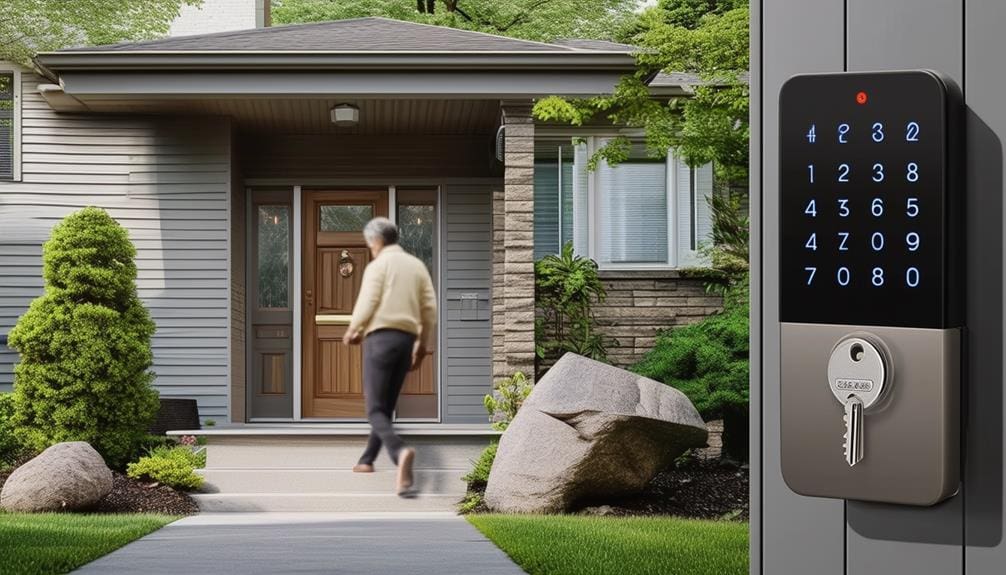
To prevent future blockages, establish a habit of double-checking that you have your keys before leaving your home. Always designate a specific spot, such as a hook or a bowl near the door, to place your keys. This guarantees you always know where they are. Additionally, consider installing a smart lock system. These devices allow you to open your door using a smartphone app, eliminating the need for physical keys.
Another effective strategy is to keep a spare key in a secure place. You might invest in a lockbox with a combination code, which can be discreetly installed outside your home. Make sure only trusted individuals know the code. You can also give a spare key to a nearby trusted neighbor or family member.
Frequently Asked Questions
How Do Locksmiths Verify My Identity Before Unlocking My Home?
Locksmiths confirm your identity by asking for a valid ID with your current address, cross-referencing it with property records, and sometimes requesting additional proof of residency like utility bills to guarantee they’re accessing your home securely.
What Should I Do if I Lose My House Keys Late at Night?
Imagine you’re a knight stranded outside your castle. First, stay calm; don’t panic. Call a 24/7 locksmith immediately. Secure your surroundings, verify their credentials upon arrival, and regain control of your fortress efficiently.
Can a Locksmith Help With Smart or Electronic Locks?
Yes, a locksmith can assist with smart or electronic locks. They’ll use specialized tools and techniques to open or reprogram your system, ensuring you regain access without compromising your lock’s security features.
How Much Does a Typical Locksmith Service Cost?
Imagine the locksmith arriving swiftly, tools in hand. Typically, you’ll pay between $75 and $150 for standard service. Complex tasks like rekeying or dealing with electronic locks can push costs higher, reflecting your control over security.
Are Locksmith Services Covered by Homeowner’s Insurance?
Check your homeowner’s insurance policy for emergency lockout coverage. Review the terms under “loss of use” or “additional living expenses.” Contact your insurance provider for specific details on coverage and reimbursement procedures.
Conclusion
To sum it up, if you’re locked out of your house, stay calm and follow these steps: assess your situation, verify access points, and contact Low Rate Locksmith for assistance. While you wait, think about preventive measures to avoid future lockouts. Don’t wait until you’re up a creek without a paddle; prepare now by hiding a spare key or installing a smart lock. By taking these steps, you’ll be back inside in no time.

